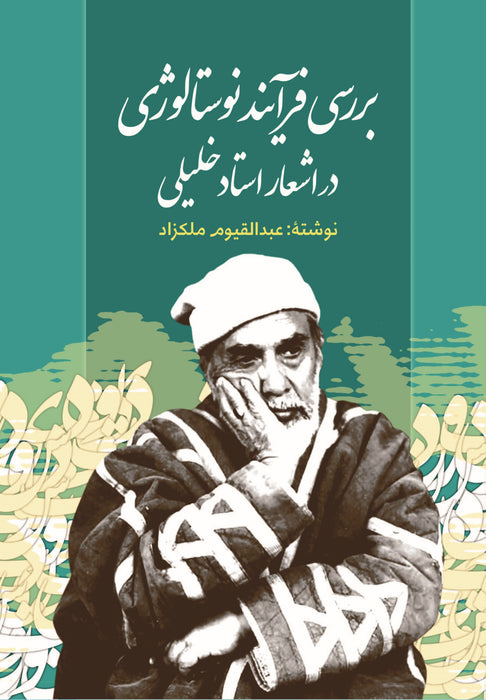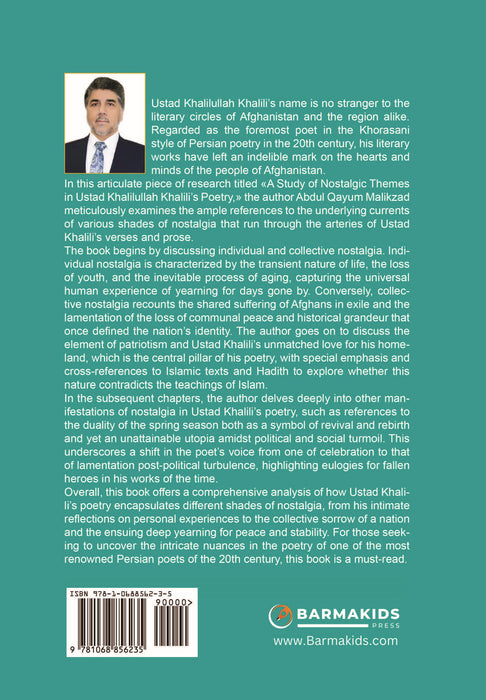
A Study of Nostalgic Themes in Ustad Khalilullah Khalili’s Poetry
Ustad Khalilullah Khalili’s name is no stranger to the literary circles of Afghanistan and the region alike. Regarded as the foremost poet in the Khorasani style of Persian poetry in the 20th century, his literary works have left an indelible mark on the hearts and minds of the people of Afghanistan.
In this articulate piece of research titled "A Study of Nostalgic Themes in Ustad Khalilullah Khalili’s Poetry," the author Abdul Qayum Malikzad meticulously examines the ample references to the underlying currents of various shades of nostalgia that run through the arteries of Ustad Khalili’s verses and prose.
The book begins by discussing individual and collective nostalgia. Individual nostalgia is characterized by the transient nature of life, the loss of youth, and the inevitable process of aging, capturing the universal human experience of yearning for days gone by. Conversely, collective nostalgia recounts the shared suffering of Afghans in exile and the lamentation of the loss of communal peace and historical grandeur that once defined the nation’s identity. The author goes on to discuss the element of patriotism and Ustad Khalili’s unmatched love for his homeland, which is the central pillar of his poetry, with special emphasis and cross-references to Islamic texts and Hadith to explore whether this nature contradicts the teachings of Islam.
In the subsequent chapters, the author delves deeply into other manifestations of nostalgia in Ustad Khalili’s poetry, such as references to the duality of the spring season both as a symbol of revival and rebirth and yet an unattainable utopia amidst political and social turmoil. This underscores a shift in the poet’s voice from one of celebration to that of lamentation post-political turbulence, highlighting eulogies for fallen heroes in his works of the time.
Overall, this book offers a comprehensive analysis of how Ustad Khalili’s poetry encapsulates different shades of nostalgia, from his intimate reflections on personal experiences to the collective sorrow of a nation and the ensuing deep yearning for peace and stability. For those seeking to uncover the intricate nuances in the poetry of one of the most renowned Persian poets of the 20th century, this book is a must-read.
استاد خلیلالله خلیلی، نامی آشنا در محافل ادبی افغانستان و منطقه است و به عنوان برجستهترین شاعر سبک خراسانی در شعر فارسی قرن بیستم شناخته میشود. بدون تردید، آثار ادبی او تأثیر عمیقی بر مخاطبان گذاشته است.
در کتاب "بررسی فرایند نوستالژی در اشعار استاد خلیلالله خلیلی"، نوشته جناب عبدالقیوم ملکزاد که توسط انتشارات برمکیان منتشر شده است، نویسنده با دقت به تحلیل جریانهای مختلف نوستالژی در اشعار و نثرهای استاد خلیلی پرداخته است. این کتاب با بررسی نوستالژی فردی و جمعی آغاز میشود. نوستالژی فردی به گذر زمان، از دست رفتن جوانی و فرآیند پیری اشاره دارد و حسرت روزهای گذشته را به تصویر میکشد. از سوی دیگر، نوستالژی جمعی به درد مشترک هم میهنان در تبعید و حسرت از دست دادن وطن با همه عظمت تاریخی آن که روزگاری هویت ملت را شکل میداد، میپردازد.
نویسنده سپس به عشق عمیق استاد خلیلی به وطن و عنصر میهندوستی در شعر او میپردازد و با تأکید بر متون اسلامی و احادیث، بررسی میکند که آیا این حس وطن پرستی با آموزههای اسلامی در تضاد است یا نه.
در فصلهای بعدی، نویسنده به دیگر جلوههای نوستالژی در اشعار استاد خلیلی میپردازد؛ از جمله دوگانگی بهار که از یک سو نمادی از تجدید حیات و تولد دوباره است و از سوی دیگر، آرمانشهری دستنیافتنی در میان آشفتگیهای سیاسی و اجتماعی روزگار به شمار میرود.
کتاب "بررسی فرایند نوستالژی در اشعار استاد خلیلالله خلیلی" تحلیل جامعی از انواع نوستالژی در شعر استاد خلیلالله خلیلی ارائه میدهد و برای آن عده علاقمندانی که به دنبال درک زیباییهای نهفته در اشعار استاد خلیلالله خلیلی استند، یک منبع ضروری به شمار میآید.

